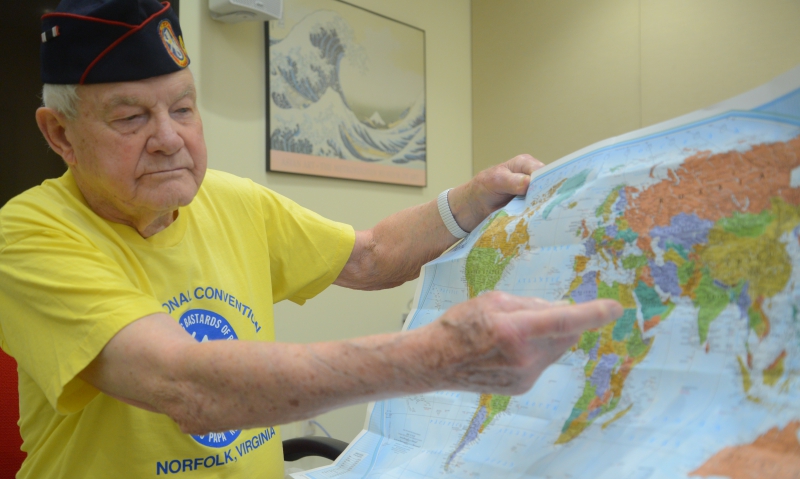
Legionnaire Dan Crowley shares his experience as a POW during World War II.
At first glance, Legionnaire Dan Crowley’s smile is bright enough to light up any room. Looking closer, his silver hair shines underneath the blue doughboy style cap he often sports. Although he is in good spirits, there is a glimmer of pain in his eyes that spans back to his military service.
Crowley, a lifetime member of The American Legion, traveled from his hometown of Simsbury, Conn., to Washington, D.C., for Veterans Day to share his struggles as an American Prisoner of War who was surrendered in 1942 after Japan invaded the Philippines. The World War II veteran also had an opportunity to fellowship with National Vice Commander Douglas L. Boldt during a Veterans Day breakfast at the White House.
Crowley enlisted in the Army Air Corps with two of his buddies on Oct. 7, 1940. He was 18 at the time. “I was a kid,” he said. “All I wanted to do at the time was travel and see the world.”
During the time leading up to his first overseas assignment, Crowley spent his days learning how to maintain military aircraft. He arrived in the Philippines in March of 1941. “That was a long journey on Uncle Sam without any training – we didn’t even go to basic. We were undertrained and unarmed,” Crowley recalled.
Upon his arrival in Manila, Crowley said he sensed war was imminent. That gut feeling came to fruition when Pearl Harbor was attacked. Crowley and other soldiers got their first taste of conflict during an improvised air defense at Nichols Field in the Philippines.
“We didn’t know what we were going to do. We had no equipment. The guns we did have were antiquated, vintage rifles from World War I that only held five rounds,” he said. The airfield was destroyed during the fight. Crowley said he still remembers seeing the infrastructure of the base lying in rubble.
Famished and weak from ailments and diseases, Crowley said American troops didn’t stand a chance against opposing forces. “We just sat out in the mud awaiting our fate.”
Shortly after, Crowley and his crew took up the trade of infantryman and joined efforts to wipe out the Japanese forces invading Bataan during the Battle of the Points. Crowley avoided the Bataan Death March after Bataan's surrender by swimming and clinging to life rafts along the route to Corregidor Island fortress, where he engaged in shore defense with the 4th Marines.
It was there, in Corregidor, where Crowley and other American troops were surrendered as prisoners of war on May 6, 1942.
“We weren’t captured, we were surrendered,” Crowley said with anger in his voice. “We were paraded through the streets of Manila. We only had two choices – do what we were forced to do, or die.”
Crowley spend time working at a few camps before he was sent to Palawan Island to help construct an air field. “We built that whole thing by hand. We even mixed the cement with our hands,” he said.
In 1944, Crowley was transported to POW Camp Tokyo #8B in Japan where he labored there and in other copper mines. He was liberated in 1945 from Ashio POW Camp Tokyo #9.
“It was pure luck that we were rescued,” he said. “We were determined to get home. Our plane was in need of maintenance. We lost two engines along the way. Somehow we made it.”
Crowley spent his life after the military working as an insurance agent. In 2014, he participated in a Japanese reconciliation program that facilitated trips for former American POWs to visit Japan.
Humbled by the experience, Crowley said he was determined to be open-minded while he went back to one of the very same copper mines he toiled in.
“For a moment I remembered the feeling of how it was when I was there. I could hear the same sounds. As I heard the water flowing and rocks falling, I remember how most of us worked there barefoot with thin cotton uniforms. I will never forget those sounds,” said Crowley.
These days, the lively, humble 94-year-old veteran said he wants to honor the men that he served with by carrying the torch as a story-teller so the world will remember the sacrifices those American troops made on foreign soil.
- Honor & Remembrance

